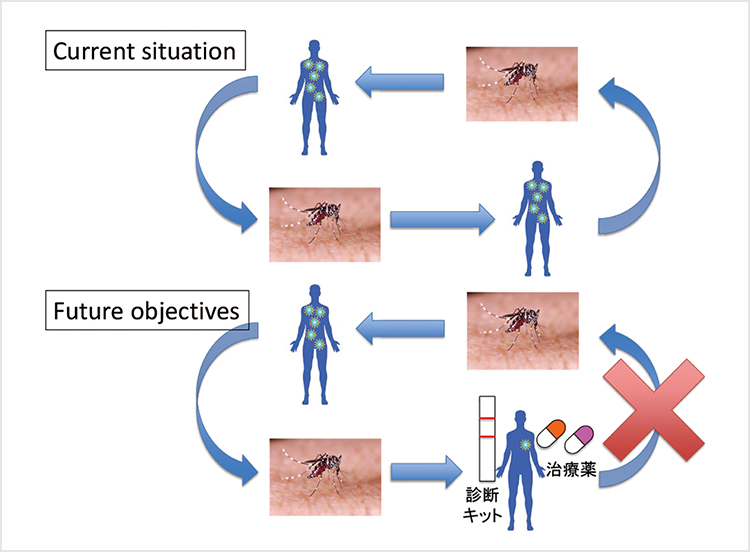Section of Antiviral Research
Recently, climate change and urbanization have increased the risk of vector-borne diseases. Dengue and chikungunya viruses cause dengue fever/hemorrhagic fever and chikungunya fever, respectively. Both viruses are transmitted by Aedes mosquitoes. In 2014, there was an outbreak of dengue fever in Tokyo. However, no antiviral drugs are available to treat these infections. Our aim is to develop antiviral drugs against dengue and chikungunya viruses.
Four serotypes of dengue virus are distributed across the world, and re-infection with different serotypes of dengue virus leads to a more severe infection. We aim to develop novel diagnostic tools that can differentiate between the four serotypes of dengue virus.
Staff
| Prof. | Tatsuo Shioda (concur.) |
|---|
Publication
- Promising application of monoclonal antibody against chikungunya virus E1- antigen across genotypes in immunochromatographic rapid diagnostic tests. Suzuki K., et al., Virol J. (2020) 17(1): 90.
- Discovery of a small molecule inhibitor targeting dengue virus NS5 RNA-dependent RNA polymerase. Shimizu H. et al., PLoS Negl Trop Dis. (2019) 13(11):e0007894.
- Evaluation of novel rapid detection kits for dengue virus NS1 antigen in Dhaka, Bangladesh, in 2017. Suzuki K. et al., Virol J. (2019) 16(1):102.
- Broad-spectrum monoclonal antibodies against chikungunya virus structural proteins: Promising candidates for antibody-based rapid diagnostic test development. Tuekprakhon A. et al., PLoS One. (2018) 13(12):e0208851.
- Evaluation of an immunochromatography rapid diagnosis kit for detection of chikungunya virus antigen in India, a dengue-endemic country. Jain J. et al., Virol J. (2018) 15(1):84.
- Variation at position 350 in the Chikungunya virus 6K-E1 protein determines the sensitivity of detection in a rapid E1-antigen test. Tuekprakhon A. et al., Sci Rep. (2018) 8(1):1094.
